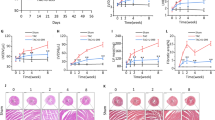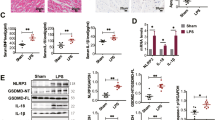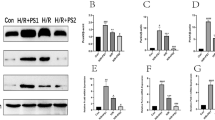Abstract
Proprotein convertase subtilisin/Kexin type 9 (PCSK9) and pyroptosis both play important roles in myocardial infarction. This study was designed to test the hypothesis that PCSK9 regulates pyroptosis in cardiomyocytes during chronic myocardial ischemia. Primary cardiomyocytes were isolated from WT and PCSK9−/− mice. HL-1 cardiomyocytes were used to set up PCSK9-deficient (PCSK9−/−) and PCSK9-upregulated (PCSK9CRISPRa) cardiomyocyte cell line with CRISPR/Cas9 knockout or activation plasmid. Additional studies were performed with chronic myocardial ischemia in WT and PCSK9−/− mice. We observed that PCSK9 initiates mitochondrial DNA (mtDNA) damage, activates NLRP3 inflammasome signaling (NLRP3, ASC, Caspase-1, IL-1β, and IL-18), and subsequently induces Caspase-1-dependent pyroptosis. There was an intense expression of PCSK9 and pyroptosis marker, GSDMD-NT, in the zone bordering the infarct area. PCSK9−/− significantly suppressed expression of NLRP3 inflammasome signaling, GSDMD-NT, and LDH release. Furthermore, serum levels of PCSK9, NLPR3 inflammasome signaling, and pyroptosis (GSDMD and LDH release) were significantly elevated in patients with chronic myocardial ischemia as compared to those in age-matched healthy subjects. Human hearts with recent infarcts also showed high expression of PCSK9 and GSDMD-NT in the border zone similar to that in the infarcted mouse heart. These observations provide compelling evidence for the role of PCSK9 in regulating Caspase-1-dependent pyroptosis via mtDNA damage and may qualify pro-inflammatory cytokines and pyroptosis as potential targets to treat PCSK9-related cardiovascular diseases.






Similar content being viewed by others
References
Almontashiri NA, Vilmundarson RO, Ghasemzadeh N, Dandona S, Roberts R, Quyyumi AA, Chen HH, Stewart AF (2014) Plasma PCSK9 levels are elevated with acute myocardial infarction in two independent retrospective angiographic studies. PLoS ONE 9:e106294. https://doi.org/10.1371/journal.pone.0106294
Buja LM, Entman ML (1998) Modes of myocardial cell injury and cell death in ischemic heart disease. Circulation 98:1335–1357. https://doi.org/10.1161/01.cir.98.14.1355
Cheng JM, Oemrawsingh RM, Garcia-Garcia HM, Boersma E, van Geuns RJ, Serruys PW, Kardys I, Akkerhuis KM (2016) PCSK9 in relation to coronary plaque inflammation: results of the ATHEROREMO-IVUS study. Atherosclerosis 248:117–122. https://doi.org/10.1016/j.atherosclerosis.2016.03.010
Cheng SB, Nakashima A, Huber WJ, Davis S, Banerjee S, Huang Z, Saito S, Sadovsky Y, Sharma S (2019) Pyroptosis is a critical inflammatory pathway in the placenta from early onset preeclampsia and in human trophoblasts exposed to hypoxia and endoplasmic reticulum stressors. Cell Death Dis 10:927. https://doi.org/10.1038/s41419-019-2162-4
Ding Z, Liu S, Wang X, Mathur P, Dai Y, Theus S, Deng X, Fan Y, Mehta JL (2016) Cross-talk between PCSK9 and damaged mtDNA in vascular smooth muscle cells: role in apoptosis. Antioxid Redox Signal 25:997–1008. https://doi.org/10.1089/ars.2016.6631
Ding Z, Liu S, Wang X, Theus S, Deng X, Fan Y, Zhou S, Mehta JL (2018) PCSK9 regulates expression of scavenger receptors and ox-LDL uptake in macrophages. Cardiovasc Res 114:1145–1153. https://doi.org/10.1093/cvr/cvy079
Ding Z, Wang X, Liu S, Shahanawaz J, Theus S, Fan Y, Deng X, Zhou S, Mehta JL (2018) PCSK9 expression in the ischaemic heart and its relationship to infarct size, cardiac function, and development of autophagy. Cardiovasc Res 114:1738–1751. https://doi.org/10.1093/cvr/cvy128
Ding Z, Wang X, Liu S, Zhou S, Kore RA, Mu S, Deng X, Fan Y, Mehta JL (2020) NLRP3 inflammasome via IL-1β regulates PCSK9 secretion. Theranostics 10:7100–7110. https://doi.org/10.7150/thno.45939
Hausenloy DJ, Yellon DM (2013) Myocardial ischemia-reperfusion injury: a neglected therapeutic target. J Clin Invest 123:92–100. https://doi.org/10.1172/JCI62874
Karmakar M, Minns M, Greenberg EN, Diaz-Aponte J, Pestonjamasp K, Johnson JL, Rathkey JK, Abbott DW, Wang K, Shao F, Catz SD, Dubyak GR, Pearlman E (2020) N-GSDMD trafficking to neutrophil organelles facilitates IL-1β release independently of plasma membrane pores and pyroptosis. Nat Commun 11:2212. https://doi.org/10.1038/s41467-020-16043-9
Maxwell KN, Fisher EA, Breslow JL (2005) Overexpression of PCSK9 accelerates the degradation of the LDLR in a post-endoplasmic reticulum compartment. PNAS 102:2069–2074. https://doi.org/10.1073/pnas.0409736102
Liu D, Zeng X, Li X, Mehta JL, Wang X (2017) Role of NLRP3 inflammasome in the pathogenesis of cardiovascular diseases. Basic Res Cardiol 113:5. https://doi.org/10.1007/s00395-017-0663-9
Liu S, Deng X, Zhang P, Wang X, Fan Y, Zhou S, Mu S, Mehta JL, Ding Z (2020) Blood flow patterns regulate PCSK9 secretion via MyD88 mediated proinflammatory cytokines. Cardiovasc Res 116:1721–1732. https://doi.org/10.1093/cvr/cvz262
Lu J, Wang X, Wang W, Muniyappa H, Deshmukh A, Hu C, Das K, Mehta JL (2012) Abrogation of lectin-like oxidized LDL receptor-1 attenuates acute myocardial ischemia-induced renal dysfunction by modulating systemic and local inflammation. Kidney Int 82:436–444. https://doi.org/10.1038/ki.2012.186
Man SM, Karki R, Kanneganti TD (2017) Molecular mechanisms and functions of pyroptosis, inflammatory caspases and inflammasomes in infectious diseases. Immunol Rev 277:61–75. https://doi.org/10.1111/imr.12534
Melone M, Wilsie L, Palyha O, Strack A, Rashid S (2012) Discovery of a new role of human resistin in hepatocyte low-density lipoprotein receptor suppression mediated in part by proprotein convertase subtilisin/kexin type 9. J Am Coll Cardiol 59:1697–1705. https://doi.org/10.1016/j.jacc.2011.11.064
Miñana G, Núñez J, Bayés-Genís A, Revuelta-López E, Ríos-Navarro C, Núñez E, Chorro FJ, López-Lereu MP, Monmeneu JV, Lupón J, Sanchis J, Bodí V (2020) Role of PCSK9 in the course of ejection fraction change after ST-segment elevation myocardial infarction: a pilot study. ESC Heart Fail 7:117–122. https://doi.org/10.1002/ehf2.12533
Momtazi-Borojeni AA, Sabouri-Rad S, Gotto AM, Pirro M, Banach M, Awan Z, Barreto GE, Sahebkar A (2019) PCSK9 and inflammation: a review of experimental and clinical evidence. Eur Heart J Cardiovasc Pharmacother 5:237–245. https://doi.org/10.1093/ehjcvp/pvz022
Muendlein HI, Jetton D, Connolly WM, Eidell KP, Magri Z, Smirnova I, Poltorak A (2020) cFLIP L protects macrophages from LPS-induced pyroptosis via inhibition of complex II formation. Science 367:1379–1384. https://doi.org/10.1126/science.aay3878
Palee S, McSweeney CM, Maneechote C, Moisescu D, Jaiwongkam T, Kerdphoo S, Chattipakorn SC, Chattipakorn N (2019) PCSK9 inhibitor improves cardiac function and reduces infarct size in rats with ischaemia/reperfusion injury: benefits beyond lipid-lowering effects. J Cell Mol Med 23:7310–7319. https://doi.org/10.1111/jcmm.14586
Raal FJ, Stein EA, Dufour R, Turner T, Civeira F, Burgess L, Langslet G, Scott R, Olsson AG, Sullivan D, Hovingh GK (2015) PCSK9 inhibition with evolocumab (AMG 145) in heterozygous familial hypercholesterolaemia (RUTHERFORD-2): a randomised, double-blind, placebo-controlled trial. The Lancet 385:331–340. https://doi.org/10.1016/S0140-6736(14)61399-4
Rathinam VAK, Zhao Y, Shao F (2019) Innate immunity to intracellular LPS. Nat Immunol 20:527–533. https://doi.org/10.1038/s41590-019-0368-3
Ricci C, Ruscica M, Camera M, Rossetti L, Macchi C, Colciago A, Zanotti I, Lupo MG, Adorni MP, Cicero AFG, Fogacci F, Corsini A, Ferri N (2018) PCSK9 induces a pro-inflammatory response in macrophages. Sci Rep 8:2267. https://doi.org/10.1038/s41598-018-20425-x
Sahebkar A, Di Giosia P, Stamerra CA, Grassi D, Pedone C, Ferretti G, Bacchetti T, Ferri C, Giorgini P (2016) Effect of monoclonal antibodies to PCSK9 on high-sensitivity C-reactive protein levels: a meta-analysis of 16 randomized controlled treatment arms. Br J Clin Pharmacol 81:1175–1190. https://doi.org/10.1111/bcp.12905
Schlüter KD, Wolf A, Weber M, Schreckenberg R, Schulz R (2017) Oxidized low-density lipoprotein (oxLDL) affects load-free cell shortening of cardiomyocytes in a proprotein convertase subtilisin/kexin 9 (PCSK9)-dependent way. Basic Res Cardiol 112:63. https://doi.org/10.1007/s00395-017-0650-1
Sun L, Ma W, Gao W, Xing Y, Chen L, Xia Z, Zhang Z, Dai Z (2019) Propofol directly induces caspase-1-dependent macrophage pyroptosis through the NLRP3-ASC inflammasome. Cell Death Dis 10:542. https://doi.org/10.1038/s41419-019-1761-4
Takahashi M (2019) Cell-specific roles of NLRP3 inflammasome in myocardial infarction. J Cardiovasc Pharmacol 74:188–193. https://doi.org/10.1097/FJC.0000000000000709
Wang X, Guo Z, Ding Z, Mehta JL (2018) Inflammation, autophagy, and apoptosis after myocardial infarction. J Am Heart Assoc 7:e008024. https://doi.org/10.1161/JAHA.117.008024
Wang Y, Shi P, Chen Q, Huang Z, Zou D, Zhang J, Gao X, Lin Z (2019) Mitochondrial ROS promote macrophage pyroptosis by inducing GSDMD oxidation. J Mol Cell Biol 11:1069–1082. https://doi.org/10.1093/jmcb/mjz020
Wree A, Eguchi A, McGeough MD, Pena CA, Johnson CD, Canbay A, Hoffman HM, Feldstein AE (2014) NLRP3 inflammasome activation results in hepatocyte pyroptosis, liver inflammation, and fibrosis in mice. Hepatology 59:898–910. https://doi.org/10.1002/hep.26592
Zeng C, Duan F, Hu J, Luo B, Huang B, Lou X, Sun X, Li H, Zhang X, Yin S, Tan H (2020) NLRP3 inflammasome-mediated pyroptosis contributes to the pathogenesis of non-ischemic dilated cardiomyopathy. Redox Biol 34:101523. https://doi.org/10.1016/j.redox.2020.101523
Acknowledgements
This study was supported by a seed grant from the Vice-Chancellor of Research & Innovation from the University of Arkansas for Medical Sciences (to Dr. Ding). Additionally, this research was in part supported by the Supporting Plan for Scientific and Technological Innovative Talents in Universities of Henan Province (19HASTIT004 to Dr. Wang) and the National Natural Science Foundation of China (U1804166, 81873459, 81370428 to Dr. Wang).
Author information
Authors and Affiliations
Corresponding author
Ethics declarations
Conflict of interest
On behalf of all authors, the corresponding author states that there is no conflict of interest.
Rights and permissions
About this article
Cite this article
Wang, X., Li, X., Liu, S. et al. PCSK9 regulates pyroptosis via mtDNA damage in chronic myocardial ischemia. Basic Res Cardiol 115, 66 (2020). https://doi.org/10.1007/s00395-020-00832-w
Received:
Accepted:
Published:
DOI: https://doi.org/10.1007/s00395-020-00832-w




